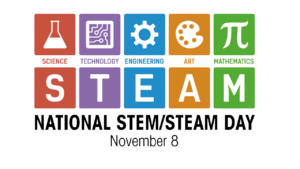I’m a supporter of STEM education; but, there are a growing number of critics who believe that we are putting too much emphasis on teaching science, technology, engineering, and math subjects and not giving enough attention to the humanities or arts. As a result, there is a movement that wants to see the acronym STEM changed to STEAM, with the “A” representing the arts. Frankly, if I were going to change STEM into another acronym it would be MELTS or SMELT, with the “L” representing language. Frankly, neither MELTS nor SMELT are very catchy and, in the latter case, a bit offputting. Perhaps, STEM-L would be better. I’m not advocating that we change STEM to anything else, but I am trying to make a point. Education is about preparing our children for living life to the fullest and achieving success in whatever line of work they want to pursue. The courses that best do that are the ones that help students learn to solve problems. Once those skills are learned they can be applied to any subject in any field to address any challenge. I believe that problem-based STEM education is the best way to teach those skills. That’s why I, along with a few colleagues, founded The Project for STEM Competitiveness — to help get a project-based, problem-solving approach into schools. I would add language into the mix because having a facility to communicate clearly is also essential for success.
Emily Eckart, a fiction writer, is one those people who believes too much stress is being placed on STEM education. Her arguments echo many of those I’ve read from others who fear that we trying to force our children into becoming scientists, mathematicians, engineers, or technologists. “Those of us who cherish the humanities,” she writes, “know well the disappointment our math and science teachers express when we choose to ‘squander’ our bright young minds.”[1] Eckart seems to believe that those of us who have selected more technical careers have no appreciation for literature, art, or music. She’s wrong. As her own situation proves, it’s easy to choose to leave the sciences for the humanities. That doesn’t diminish the value of the skills that can and must be learned through a good foundation in STEM subjects. Eckart’s next argument is the one that troubles me most. She writes:
“It is commonly claimed that STEM majors are the ‘most valuable’ — value being defined as immediate job offers and high earnings. Articles promoting STEM have a clear focus: jobs and money. College is increasingly viewed as a form of vocational training, useful only for teaching the quantitative skills that our data-obsessed society demands. The current shrill insistence that young people study STEM is well-intentioned, but short-sighted. Our data-obsessed society demands that education consist only of measurable skills. It is no surprise that this quantitative mind-set favors math and science, which express themselves in the language of numbers.”
I agree that definitions of “value” and “success” that focus on material things are short-sighted and skewed. I also believe, however, that having a job and supporting one’s self and one’s family is essential for self-esteem and building up one’s self-worth. One only needs to look at troubled areas around the globe to find that a large unemployment rate among the young is one of the reasons for unrest. We should never apologize for trying to prepare our children for employment. Although I believe the “language of numbers” is important in most careers, including many which are considered non-technical, Eckart and I do agree on one thing, people need to be able to express themselves in other ways as well. Almost every employer rues the fact that employee communication skills (both oral and written) appear to be on the decline. Eckart writes:
“Defenders of the humanities have long recognized that the study of history, literature, art and language develop other skills that are critical for students’ success. With their focus on careful reading and analysis of texts, humanities foster clear communication, both in speaking and in writing. In an increasingly global world, there are many questions that don’t have certain answers, such as what is ethical and what it means to live a good life. In Educational Leadership, David Ferrero summarizes humanities perfectly: They are subjects dedicated to the development of ‘reflective citizens, wise leaders, and good persons.'”
I have no disagreement with that line of reasoning; especially Eckart’s point about the criticality of learning how to read carefully, analyze thoughtfully, and communicate clearly. At the end of the day, however, there are going to be more opportunities for computer programmers than there will be for English teachers. We need both; but, we also need to be realistic. Kevin Wheeler (@kwheeler), founder and President of The Future of Talent Institute, is another skeptic when it comes to pushing STEM education. He bluntly states, “Is what we are preaching to young people about their education good advice? I have a feeling it may be crap. Every day I hear someone saying that the future is all about science, technology, engineering or math — the STEM subjects.”[2] In some ways, his arguments echo those of Eckart. Wheeler writes that students are assured that a STEM education “will land them a great job with high pay. They are told that these will be the centerpiece skills of the future. Whether this is true or not, it seems that almost everyone has drunk the Cool-Aid.” Wheeler knows full well that there are no guarantees in life; but, more importantly, he seems to miss entirely the point that the problem-solving skills learned in STEM subjects are going to equip students to better meet life’s challenges. That’s not crap.
One of the reasons that these skills are going to be so important is that we really don’t know what jobs are going to be available in the future because they don’t currently exist. Since we can’t train our students with specific skills, we need to teach them general problem-solving skills that can be used regardless of where life takes them — into the sciences or into humanities. Heidi Kleinbach-Sauter (@KleinbachSauter), Balaji Ganapathy (@musafirbala), and Edie Fraser assert that STEM education should stress four “capability platforms”: digital fluency; innovation excellence; employability skills; and hard skills.[3] They write:
- Digital Fluency can be defined as the application of STEM learnings to specific “real world” problems. Learning the basics of mathematics is STEM 1.0; leveraging a STEM education to solve stubborn problems in the banking world, or modeling data to predict consumer behavior, is quite another. In short, it is a skills evolution — from how to apply skills to what to do with those skills.
- Innovation Excellence requires a re-framing of the collective thinking about invention and innovation. Across all industries, executives are looking for innovators — not simply inventors. The distinction may sound minor, but it’s not. Whereas invention is often pegged to inspiration, profitable and sustainable innovation is a process. It takes discipline, rigor, and a determination to attack a problem or opportunity methodically, from all angles. This evolution requires a shift from focusing on solving complex technical problems to defining and redefining the right problem before solving it and doing this in the context of the market and business environment of the future.
- Employability Skills are the behaviors above and beyond technical skills that enable STEM employees to create stakeholder momentum to commercialize ideas, or in short career skills. It is the ability to present and “sell” their ideas to others; to function in teams; to develop business acumen; to develop leadership skills; to navigate across complex, matrixes global organizations.
- Hard Skills are the industry-specific skills that must be mastered in order for students to excel in new careers in industries in fields like: advanced manufacturing, energy, food & agriculture, information technology, and many others.
I agree that students not only need to learn skills but need to learn how to apply those skills in real-world situations; but, that logic applies to all STEM skills not just digital fluency. The other “capability platforms” are more problematic in that they reinforce Eckart’s and Wheeler’s perception that STEM education is all about jobs and money. The “hard skills” platform is particularly problematic since the U.S. Department of Labor believes that 65% of today’s grade school kids will end up in a job that doesn’t yet exist. As I wrote in a previous article, “STEM Education is About Succeeding in Life,” success is not measured only in accumulated wealth. No sane person wants to discourage great writers, great artists, or great musicians from pursuing their passion; however, for society to function and flourish, it needs an economy that can fully employ its citizens with meaningful work. The humanities flourish when economies are robust. It’s a win-win situation. STEM education can help make that happen.
Footnotes
[1] Emily Eckart, “We’re way too obsessed with pushing science and math on our kids,” The Washington Post, 29 December 2015.
[2] Kevin Wheeler, “Is Urging STEM Education Misguided?” LinkedIn, 13 January 2015.
[3] Heidi Kleinbach-Sauter, Balaji Ganapathy, and Edie Fraser, “STEM 2.0: An Imperative for Our Future Workforce,” Diplomatic Courier, 14 January 2015.





